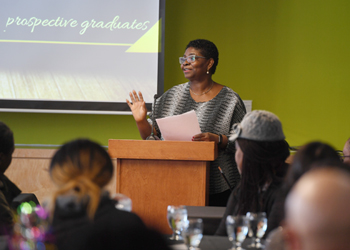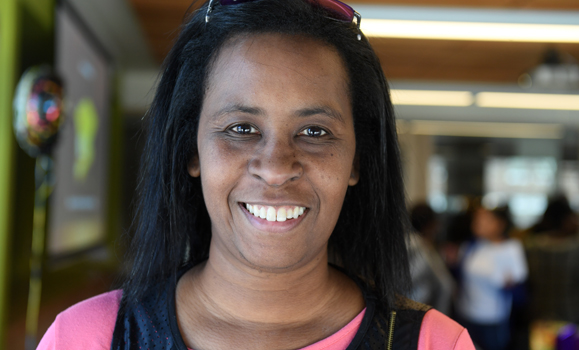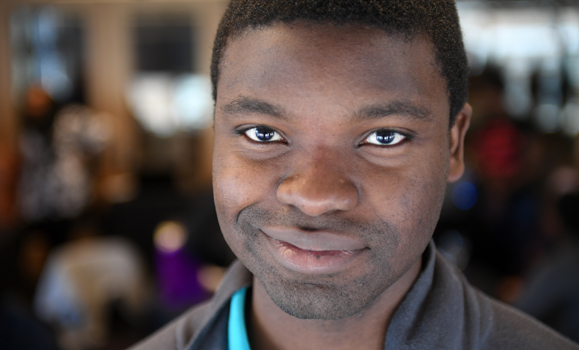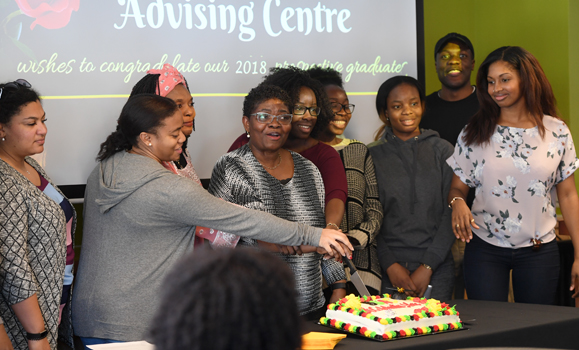On the afternoon of April 10, DalhousieтАЩs Black Student Advising Centre (BSAC) held an intimate luncheon to celebrate graduating students who frequent the centre тАФ the 10th anniversary of the annual celebration.
 ItтАЩs been done every year out of a sense of love that Oluronke (Ronke) Taiwo (right), BSACтАЩs advisor, has for the students and her passion for recognizing their achievements at Dal. тАЬI care for the studentsтАЩ sense of belonging,тАЭ she says.
ItтАЩs been done every year out of a sense of love that Oluronke (Ronke) Taiwo (right), BSACтАЩs advisor, has for the students and her passion for recognizing their achievements at Dal. тАЬI care for the studentsтАЩ sense of belonging,тАЭ she says.
There were 24 graduating students among the 80+ attendees at this yearтАЩs event, which featured a presentation and slide show celebrating the students and a heartfelt speech by Ronke. She says that these celebrations not only support Black students by recognizing their achievements, they also create a safe space where they can connect with people from similar backgrounds. ItтАЩs a familial sense of community that permeates throughout BSAC.

This network of support has deeply impacted Montreal native Lisa Dennis (above), graduating this year from the Master of Occupational Therapy post-professional program. тАЬMyself and another student are the first two Black students graduating from my program,тАЭ she says. тАЬIt gets lonely being the only Black person in a field.тАЭ She adds that BSAC has been a valuable resource for her because of the connections sheтАЩs been able to make with students who share similar experiences.

Henry Annan (above), a student from Halifax graduating from the ║┌┴╧│╘╣╧═ЇMedical School, shared a similar experience, noting that there are traditionally тАЬnot a lot of Black students in medicine.тАЭ (Though those numbers are growing: the Faculty of Medicine has graduated six students of African descent in each of the past two years.)
Creating connections
This is precisely why Ronke is so devoted to having BSAC as a strong presence on campus and organizing events such as the graduation luncheon. Celebrating the studentsтАЩ achievements helps to inspire and encourage them to overcome the struggles they may face, both academically and as minorities in their fields.
тАЬThey feel as if they can do it and that someone cares for them,тАЭ she says. Ronke takes on a surrogate mother role of sorts with her students. She encourages them throughout their time at Dal тАФ right through to attending their Convocation ceremonies, because she says it is important for other students to see Black students graduating, and for there to be someone there to support them through their journey.

Henry and LisaтАЩs journeys after Convocation will take them into careers in which they both plan to support youth. Henry will be starting a pediatrics residency at the IWK Health Centre this summer. Lisa plans to work in a private practice and is focusing on the high rate of African Nova Scotian students in the Individual Program Plan or IPP тАФ an educational program designed for students who arenтАЩt expected to meet the regular academic requirements of their grade level. But with proper support, like the kind she has found with Ronke and BSAC, she believes these students can achieve exponentially more than the bare minimum тАФ and the qualities of BSAC will be paid forward to the next generations of Black students.

